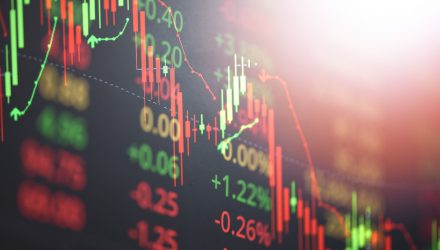The CBOE Volatility Index and VIX-related exchange traded funds jumped on Friday as poor consumer sentiment weighed on the outlook for the pace of the economic recovery.
Among the best-performing non-leveraged ETFs of Friday, the iPath Series B S&P 500 VIX Short Term Futures ETN (NYSEArca: VXX) increased 6.8% and the ProShares VIX Short-Term Futures ETF (NYSEArca: VIXY) advanced 6.8%. Meanwhile, the CBOE Volatility Index climbed 12.3% to 20.99, breaking above its long-term resistance at the 200-day simple moving average.
Risk assets are being weighed down by a number of factors, such as data in the U.S. and China, the spread of the COVID-19 Delta variant, and concerns over inflation. While investors saw the first sign of inflation easing and an unexpected rise in retail sales, the slightly higher initial jobless claims (a proxy for layoffs) weighed on sentiment, the Wall Street Journal reports.
“(It was) a volatile week and a return to value outperformance as ‘buy the dip’ sentiments took hold, but not enough to rescind the recent market weakness,” Louise Dudley, global equities portfolio manager at the international business of Federated Hermes, told Reuters.
The University of Michigan showed that consumer sentiment remains subdued and is about where it was in August, with inflation expectations still high.
ThinkMarkets analyst Fawad Razaqzada warned of the ongoing risks like economic growth in the U.S. and China being weak with inflation rising, especially as equities valuations are at near record levels.
“Investors are just starting to wake up to the risk facing them,” Razaqzada told the WSJ.
Looking ahead, concerns over a potential hike in corporate taxes could also weigh on earnings and the broader markets as leading Democrats plan to raise the top tax rate on corporations to 26.5% from 21%.
“We anticipate large cap volatility as changes to U.S. corporate tax rates play a role going forward as the two sides negotiate, particularly for the ‘low tax’ sectors implicated such as tech and biotech, and companies with hefty international revenues,” Dudley added.
For more information on the markets, visit our current affairs category.
